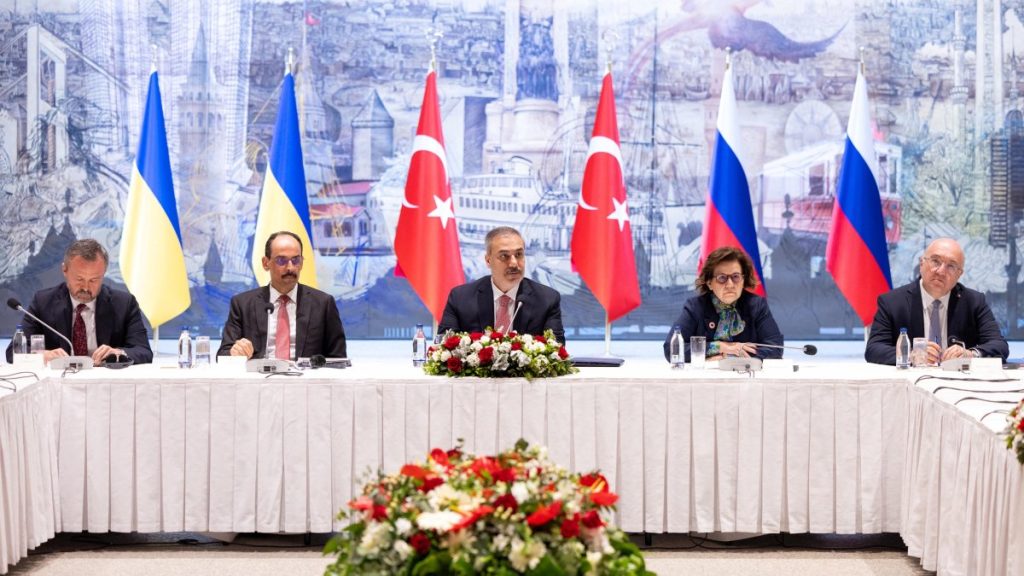Two days of Russia-Ukraine talks in Istanbul to end the prolonged conflict yielded results after a diplomatic blitz by Türkiye. Although the sides failed to agree upon a lasting peace, the talks paved the way for future breakthroughs.
Türkiye was under the spotlight this week with its efficient diplomacy, a culmination of years of efforts to help the two sides with which it enjoys good relations mend ties.
Talks were closely watched by everyone, from some 800 journalists from around the world to U.S. officials who tried to achieve a solution to the conflict. Yet, pundits were pessimistic over a breakthrough due to vast differences of opinion between the two sides. Those differences included a blame game where Russia and Ukraine sought to portray each other as the one not consenting to peace. President Recep Tayyip Erdoğan and Foreign Minister Hakan Fidan have been instrumental in a constructive approach between the sides. The United States also engaged with the sides, urging them not to disrespect Erdoğan’s efforts. In the end, Russia and Ukraine agreed on the exchange of 1,000 prisoners each and meeting again in the future. Along with Fidan, National Intelligence Director Ibrahim Kalın remained present in and around the Ottoman-era Dolmabahçe Palace where talks were held, persuading Russian and Ukrainian delegations not to leave the table even in times of deadlock in negotiations.
Language of peace
The last talks between the sides in Istanbul in 2022 hosted a minor crisis when the Russian side insisted that all sides speak Russian, something objected to by Ukraine. On Friday’s talks, both delegations had interpreters ready. Fidan, at times, intervened in English and Turkish while the sides occasionally spoke English. So, four languages were spoken during the talks.
US involvement
The talks were originally planned to be quadrilateral, with participation of the U.S. and Türkiye as well, but at the last minute, Russia voiced reservations about the U.S. presence. Still, the Russian delegation’s head, Vladimir Medinsky, held talks with Michael Anton, the director of policy planning at the U.S. State Department, in an Istanbul hotel before the second round of talks began on Friday.
Tensions, success
The two warring sides took their argument to Dolmabahçe as well. When the Russian side cited historic examples of “states ceasing to exist because they did not give up small portions of lands, Ukrainian delegation’s head Rustem Umerov reminded them that they were not in Istanbul to “talk history” and urged them to focus on “concrete steps.” Umerov’s retort stirred up tensions. Ukraine then proceeded to propose a “30-day, 60-day or 90-day cease-fire” that would “pave the way for talks between leaders of both countries and for confidence-building measures. They insisted that peace would be impossible without a cease-fire first and suggested that they would talk about the humanitarian aspects of the situation once a cease-fire was in force. Russia, in turn, listed a series of conditions, from withdrawal of any foreign troops in Ukrainian territories, an end to arms imports and possession of weapons and mass destruction, and called on Ukraine not to be a member of NATO. Russia also insisted on Ukrainian troops’ withdrawal from four regions they claimed had a predominantly Russian population. Ukraine opposed it, saying even a withdrawal of 300 meters (984.25 feet) would be a concession.
At this point, talks headed to a deadlock, but a lunch break eased tensions and Fidan suggested switching to confidence-building measures. The sides agreed and proceeded.
Confidence-building measures focused on humanitarian passage to conflict zones and access for the Red Cross to inaccessible areas. The sides then discussed an exchange of prisoners, initially exclusively for captured troops and at a very low number than the final agreement. Türkiye proposed the exchange of civilians as well. The delegations then separately discussed the matter with the Kremlin and Kyiv and ultimately agreed to include civilians in the exchange and agreed to exchange 1,000 prisoners each. They also asked Türkiye to host the exchange of key figures. It is expected that the exchange process would take another two weeks.
Ankara also asked the sides to continue talks in the future. Sources said one side was ready to return to Türkiye next week for the next round, while the other expressed readiness but was undecided on the date. Sources declined to say which side agreed to return next week.
Prospects of a peace were high before the talks as both the Russian and Ukrainian presidents were anticipated to take part. Yet, details of the talks were not clear until the very last minute. It was apparently President Erdoğan who urged the sides not to raise hopes if the Istanbul talks would not yield tangible results for peace. Similarly, Fidan told his U.S. counterpart, Marco Rubio, that the Istanbul talks were well publicized and failure to achieve peace would extinguish remaining hopes.


